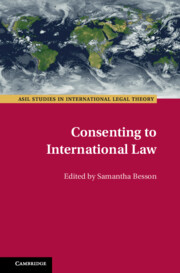Book contents
- Consenting to International Law
- ASIL Studies in International Legal Theory
- Consenting to International Law
- Copyright page
- Contents
- Contributors
- Preface
- Consenting to International Law
- Part I Notions and Roles of Consent
- Part II Objects and Types of Consent
- Part III Subjects and Institutions of Consent
- 11 The Consent of International Organizations in the Making of General and Conventional Rules of International Law
- 12 Consent and Informal Law-Making
- 13 Consent as a Guarantee of the Democratic Legitimacy of International Law
- 14 From Equal State Consent to Equal Public Participation in International Organizations
- 15 Autonomy in International Law
- Index
13 - Consent as a Guarantee of the Democratic Legitimacy of International Law
from Part III - Subjects and Institutions of Consent
Published online by Cambridge University Press: 23 November 2023
- Consenting to International Law
- ASIL Studies in International Legal Theory
- Consenting to International Law
- Copyright page
- Contents
- Contributors
- Preface
- Consenting to International Law
- Part I Notions and Roles of Consent
- Part II Objects and Types of Consent
- Part III Subjects and Institutions of Consent
- 11 The Consent of International Organizations in the Making of General and Conventional Rules of International Law
- 12 Consent and Informal Law-Making
- 13 Consent as a Guarantee of the Democratic Legitimacy of International Law
- 14 From Equal State Consent to Equal Public Participation in International Organizations
- 15 Autonomy in International Law
- Index
Summary
The author makes the case for a new understanding of the role of consent in international law. She begins by noting that the question of consent should be as central to international law as it is in other fields of law because legal norms give rise to power relations and impose constraints upon those to whom they apply, and those in power want these constraints to be accepted. Yet, the question of consent was, as the chapter claims, never raised in the classical era when State sovereignty made it possible for States to adopt international norms without their subjects’ consent. With the Enlightenment, however, the people’s consent through representation became the foundation of domestic law. Yet, most of the time, representation is, according to the author, formal and serves to justify the law as if it were produced by the general will. Because international law reflects the fickle concurrence of States’ wills, the world community’s law does not rely on popular consent. The world community is confronted with difficult challenges, and it needs, more than ever, norms that can meet this moment.
Keywords
- Type
- Chapter
- Information
- Consenting to International Law , pp. 296 - 313Publisher: Cambridge University PressPrint publication year: 2023



